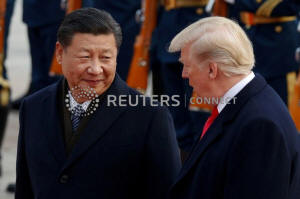|
China denies 'slanderous' economic
espionage charges from U.S., allies
 Send a link to a friend
Send a link to a friend
 [December 21, 2018]
By Philip Wen [December 21, 2018]
By Philip Wen
TIANJIN, China (Reuters) - China's Foreign
Ministry said on Friday it resolutely opposed "slanderous" accusations
from the United States and other allies criticizing China for economic
espionage, urging Washington to withdraw its accusations.
The United States should also withdraw charges against two Chinese
citizens, the ministry said, adding that China had never participated in
or supported any stealing of commercial secrets and had lodged "stern
representations" with Washington.
"We urge the U.S. side to immediately correct its erroneous actions and
cease its slanderous smears relating to internet security," it said,
adding that it would take necessary measures to safeguard its own
cybersecurity and interests.
It has long been an "open secret" that U.S. government agencies have
hacked into and listening in on foreign governments, companies and
individuals, the ministry added.
"The U.S. side making unwarranted criticisms of China in the name of
so-called 'cyber stealing' is blaming others while oneself is to be
blamed, and is self-deception. China absolutely cannot accept this."
U.S. prosecutors indicted two Chinese nationals linked to China's
Ministry of State Security intelligence agency on charges of stealing
confidential data from American government agencies and businesses
around the world.

Prosecutors charged Zhu Hua and Zhang Shilong in hacking attacks against
the U.S. Navy, the space agency NASA and the Energy Department and
dozens of companies. The operation targeted intellectual property and
corporate secrets to give Chinese companies an unfair competitive
advantage, they said.
The pair were members of a hacking group known within the cyber security
community as APT 10 and also worked for a Tianjin company Huaying Haitai
Science and Technology Development Co, prosecutors said.
Reuters was unable to locate immediately contact details for Zhu or
Zhang.
Corporate records show Huaying Haitai is registered at an address in a
non-descript yellow office tower complex in the southern fringes of
Tianjin, which is about an hour's drive southeast of capital Beijing.
A woman who answered the door to the small unmarked office told Reuters
she worked for an advertising company which had only moved in months
earlier.
She confirmed the previous occupants were a company called Huaying
Haitai, but said she was unsure what they did.
PROPERTY THEFT
Britain, Australia and New Zealand joined the United States in slamming
China over what they called a global campaign of cyber-enabled
commercial intellectual property theft, signaling growing global
coordination against the practice.
China's Foreign Ministry said Britain and other countries had also made
"slanderous comments" stemming from "ulterior motives".
Five sources familiar with the attacks told Reuters the hackers breached
the networks of Hewlett Packard Enterprise Co <HPE.N> and IBM <IBM.N>,
then used the access to hack into their clients' computers. IBM said it
had no evidence that sensitive data had been compromised. HPE said it
could not comment.
Chinese Foreign Ministry spokeswoman Hua Chunying told reporters she
noted IBM's statement that it had no evidence sensitive data had been
compromised.
[to top of second column]
|

President Donald Trump takes part in a welcoming ceremony with
China's President Xi Jinping at the Great Hall of the People in
Beijing, China, November 9, 2017. REUTERS/Damir Sagolj

Certain people in the United States have taken to regular slandering
of China, Hua told reporters.
"Perhaps they think that if they repeat a lie 1,000 times it becomes
the truth. But I want to tell them that it's still a lie even if
repeated 10,000 times."
China-U.S. ties in recent months have also been affected by a
protracted trade war, though there is currently a truce as both
countries try and work out a resolution.
Asked whether China's anger over the cyber accusations would impact
upon China-U.S. trade talks, Hua reiterated a line from the
ministry's statement earlier in the day that if the United States
did not mend its ways then relations would be seriously harmed.
Adding to the tensions, on Thursday China denounced a new U.S. law
related to Tibet.
The official China Daily wrote in an editorial on Friday that the
new Tibet-related legislation added an "additional flashpoint" to
already rocky relations.
"With Washington favoring a confrontational approach aimed at
maintaining its hegemony rather than a cooperative one for the
common good, Beijing will have to be prepared to stand its ground
and respond as necessary to safeguard its core interests."
The Australian foreign affairs and home affairs departments said in
a statement that APT 10 was engaged in "sustained cyber intrusions"
on large managed service providers (MSPs), or information technology
contractors globally.
"Australia calls on all countries, including China, to uphold
commitments to refrain from cyber-enabled theft of intellectual
property, trade secrets and confidential business information with
the intent of obtaining a competitive advantage," the joint
statement said.
An Australian government source said the Chinese had breached "a
small number" of targets but the extent of the attack was unclear.
"We may never know how many companies were impacted," said the
source, who spoke on condition of anonymity because he was not
authorized to comment on the attacks. "We've informed those caught
up but we need others to make urgent checks."

Nick Savvides, chief technology officer for cybersecurity provider
Symantec Corp <SYMC.O> in Asia Pacific, said in an email that cyber
espionage had become "overt in recent years".
"Attackers are getting clever, hiding in plain sight by using tools
and techniques already installed on targeted computers, making them
difficult to detect," he added in the email which did not mention
China.
(Reporting by Philip Wen; Additional reporting by Ben Blanchard,
Zhang Min, Colin Packham and Byron Kaye; Editing by Paul Tait and
Michael Perry)
[© 2018 Thomson Reuters. All rights
reserved.]
Copyright 2018 Reuters. All rights reserved. This material may not be published,
broadcast, rewritten or redistributed.
Thompson Reuters is solely responsible for this content. |